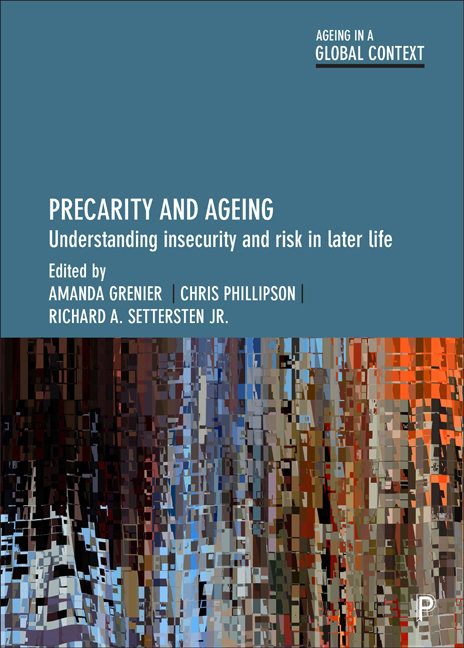Book contents
- Frontmatter
- Contents
- List of Figures and Tables
- Notes on Contributors
- Editors’ Acknowledgements
- Series Editors’ Preface
- 1 Precarity and Ageing: New Perspectives for Social Gerontology
- PART I Life Course Perspectives on Precarity
- PART II Precarity Across Situations
- PART III Austerity, Care and Social Responses to Precarity
- Index
3 - Precarious Life, Human Development and the life Course: Critical Intersections
Published online by Cambridge University Press: 02 March 2021
- Frontmatter
- Contents
- List of Figures and Tables
- Notes on Contributors
- Editors’ Acknowledgements
- Series Editors’ Preface
- 1 Precarity and Ageing: New Perspectives for Social Gerontology
- PART I Life Course Perspectives on Precarity
- PART II Precarity Across Situations
- PART III Austerity, Care and Social Responses to Precarity
- Index
Summary
Introduction
In this chapter, I explore human development and the life course as precarious forms of life. The first part reviews the literature on precarity to draw out some of the critical and ethical issues related to ageing populations. The second part follows with an examination of how figures of the obese child, unstable adolescent, despairing mid-lifer and cognitively impaired older adult are examples of crisisladen personifications of social problems. The two parts are connected through an approach similar to what Imogen Tyler (2008, p 18) calls a ‘figurative methodology’, whereby ‘social classifications’ are generated by ‘representational struggles’ that in turn are ‘played out in highly condensed figurative forms’:
A figurative methodology makes it possible to describe – zoom in on – appearances of a figure within specific media and contexts, whilst also insisting that it is through the repetition of a figure across different media that specific figures acquire accreted form and accrue affective value in ways that have significant social and political impact. (Tyler, 2008, p 19)
While these figurative forms for Tyler are British class-making identities, here they are age-making ones. Rather than adhering to any one biological, psychological or gerontological model, my perspective on human development and the life course focuses on their discursive and interchangeable meanings in the social sphere, where the human sciences, public health politics and cultural narratives about ageing have converged.
The chapter's conclusions consider and compare resilience and resistance as two responses to life course precarity. Resilience, in ageing research and associated professional practices, typically refers to the natural capacity of individuals, families and communities to cope with and bounce back from adversity. As such, resilience offers a corrective to passive and pathologizing stereotypes of older adults as deficient in adaptability, agency and resourcefulness. However, this meaning also implies that any failure to manage vulnerability, frailty, disability and dependency is because of a lack of personal resilience rather than the social determinants of liveability. In this way the resilience literature reiterates the successful and healthy ageing models it claims to supersede. My conclusions advocate a second response, however, which is to refuse to be the subjects we have become, to pursue alternative paths that contest dominant global life course hierarchies and their fashioning of age identities through crisis, precarity and resilience, and to imagine new strategies for radical and non-precarious life course trajectories into the future.
- Type
- Chapter
- Information
- Precarity and AgeingUnderstanding Insecurity and Risk in Later Life, pp. 41 - 66Publisher: Bristol University PressPrint publication year: 2020



